- Home
- Charles de Lint
From a Whisper to a Scream
From a Whisper to a Scream Read online
The author and publisher have provided this e-book to you without Digital Rights Management software (DRM) applied so that you can enjoy reading it on your personal devices. This e-book is for your personal use only. You may not print or post this e-book, or make this e-book publicly available in any way. You may not copy, reproduce or upload this e-book, other than to read it on one of your personal devices.
Copyright infringement is against the law. If you believe the copy of this e-book you are reading infringes on the author’s copyright, please notify the publisher at: us.macmillanusa.com/piracy.
Table of Contents
Title Page
Copyright Notice
PREFACE
ONE
OCTOBER 1988
NOVEMBER 1988
TWO
AUGUST 1990
THREE
FOUR
FIVE
SIX
SEVEN
EIGHT
NINE
TEN
ELEVEN
TWELVE
THIRTEEN
FOURTEEN
FIFTEEN
SIXTEEN
SEVENTEEN
EIGHTEEN
NINETEEN
TWENTY
TWENTY-ONE
TWENTY-TWO
TWENTY-THREE
TWENTY-FOUR
BY CHARLES DE LINT FROM TOM DOHERTY ASSOCIATES
Copyright Page
FOR ANDREW VACHSS
A LIGHT IN THE DARKNESS
WITH SPECIAL THANKS TO JOHN MAJOR FOR TECHNICAL ADVICE
PREFACE
Sometimes the darkness calls and I find myself approaching it. Not because it has any sort of appeal to me, but to try to understand it.
One of the ongoing themes of my work is the effect that preternatural encounters have on the ordinary person. Mostly, the darker sections of my novels arrive from the human psyche, with the magical elements playing against that shadow. The Otherworld, however, contains as much darkness as it does ambiguity and light, and to ignore it strikes me as telling only half the story. Hence the books I wrote under the pen name Samuel M. Key.
From a Whisper to a Scream originally had a working title of Niki and was the first full-length Newford novel. (The Dreaming Place came before it, but at just under 50,000 words, it strikes me as more of a novella.) In retrospect, considering the somewhat whimsical tone of most of the Newford stories up to that point (later collected in Dreams Underfoot), it seems a little odd to me that I’d choose such a dark story as my first novel-length excursion into the city. However, I remember at the time that I hadn’t thought the story would be as dark as it turned out to be when I actually sat down to write it.
When my first “horror” novel, Mulengro, appeared in 1985, readers picked it up expecting the usual de Lint novel. Mulengro has many of the elements that readers have come to expect in my work, but it also contains somewhat graphic descriptions of violence and its aftereffects which some readers found disturbing. I can well understand that some people prefer not to read horror fiction, so one of the reasons I decided to create “Samuel M. Key” was so that readers could differentiate between the types of fiction I was writing. The Key books would be the darker ones. No secret was made of the fact that the pseudonym was mine, since it was merely a device to let readers know in advance that they could expect a darker story between the covers.
If you’d like to know more of the origins of Sam Key, please visit my Web site at www.charlesdelint.com/faq.htm.
The Sam Key books are dark, and at times, graphically rendered novels, From a Whisper to a Scream as much as any of the others. Though ultimately they reach for the light, the journey to get there becomes both arduous and harrowing in places. Much like life itself, really, reminding us to take care of each other along the way.
ONE
OCTOBER 1988
Thomas Morningstar was on traffic duty that month. He didn’t mind the eight-to-four shift, but unlike most of the cops he worked with, he preferred a night foot patrol. Being stuck in a car for most of the day just made him antsy. When you walked a beat, you still felt as though you had some connection to the world around you. The stars kept you company, distanced only by the haze of lights that the city cast up into the darkness. The wind knew where to find you.
The blue-and-white patrol car, with the gold badge of the Newford Police Department on its doors, was too confining. The squawk of the radio, trapped between metal and glass, was a constant irritation. Looking out at the street through a windshield was too much like observing the world through the glass screen of a television set.
But he could be patient. This was his last day on traffic. Two days off, and he’d be back to hoofing it once more: evening shift, walking a one-armed post along Grasso Street. But before that he had to go up to the reserve to see his father.
Big Dan Morningstar was the elected chief of the Kickaha Reserve. He considered Thomas, his eldest son, to be his only failure.
“You want to be a cop, why don’t you join the Tribal Police?” he demanded at least once on every visit Thomas made. “But no. You want to pretend to be a white man. You want to marry a white girl. You’re ashamed of your people and that brings me shame. Why can’t you be more like your brother?”
John was unemployed and still lived with their parents, but that was never brought up, because his politics were correct. Still, he, at least, understood Thomas’s position.
Thomas wasn’t ashamed of his heritage; he just didn’t want to live on the reserve. That was the reason he had entered law enforcement, but not simply to escape. He truly believed that the only hope for his people to find a prosperous future was for them to meet white society on its own terms, to have a say in the making and keeping of its laws, while still maintaining links with their own traditions. And was it his fault that the woman who stole his heart was white? Why should it make any difference what color Angie’s skin was so long as they loved each other?
He would sit on the porch of his parents’ house with those thoughts in mind, but he no longer voiced them. He would keep his face stoic as he listened to his father, and he wouldn’t argue. He’d long since given up trying to change his father’s mind.
His mother had never expressed her feelings on the subject, but she didn’t need to. Thomas could always sense her unspoken approval. It was to see her and John that he tried to come by at least a couple of times a month. Angie never drove up with him.
He thought of Angie now as he headed north on Williamson, where it cut through the Tombs, and was only half paying attention to the driver in the vehicle ahead of him. The radio squawked, and the dispatch receiver informed all units of a possible domestic over in the Rosses. Thomas was close enough to catch the squeal and reached for the microphone, but another unit beat him to it.
Just as well. He hated catching a domestic. You never knew what you were going to walk into—a normal argument that had escalated a little too loudly and caused the neighbors some concern, or some wacko standing there in the hallway, waiting for you with a sawed-off shotgun.
As Thomas straightened in his seat, some sixth sense made him pay closer attention to the occupant of the car in front of his own. The man kept glancing back at him in his rearview mirror, then quickly shifting his gaze to the road ahead. He seemed jumpy, more high-strung than was normal, even taking into consideration the nervousness that all citizens seemed to feel in the proximity of a police officer—whether they were guilty of something or not.
Thomas made a mental note of the license plate number and started to apply his brakes as the lights at MacNeil up ahead turned amber. In the car ahead of him, the man’s gaze met Thomas’s in the rearview mirror, holding it for a
beat. Panic flickered in the man’s eyes and he suddenly stepped on the gas.
His car shot across the intersection and just narrowly missed being struck by an eager motorist jumping the light. With a squeal of tires, he sped off. Thomas hit his lights and siren. He waited long seconds for the cars on MacNeil to let him through, then set off in pursuit. Steering with one hand, he hooked free the microphone and called in to his dispatch receiver.
“This is Charlie-car; in pursuit of a brown, late-model Buick heading north on Williamson through the Tombs.” He gave the license plate number and the few meager details of description he had of the driver.
“Copy, Charlie-car,” the dispatcher replied. “Do you require assistance?”
“Wouldn’t hurt. I’ve got a bad feeling about this.”
“Backup’s on the way. Ten-four.”
Thomas dropped the microphone. Letting it dangle loosely from its cord, he concentrated on the pursuit. He’d seen the Buick make a sharp right two blocks north of MacNeil as he was signing off, but when he made the turn himself, the car was no longer in sight.
Siren blaring, he gunned the engine and raced up the deserted street.
This part of the city was nightmare country. The Tombs stretched for what seemed like endless blocks of derelict buildings, rubble-strewn lots, abandoned cars, and refuse. It was home to junkies and biker gangs, homeless squatters and runaways. Citizens’ groups had been screaming for years to get the city to clean it up, to no avail.
Thomas slowed down at each cross street he came to, looking sharply left and right, but the Buick seemed to have vanished into the jungle. He killed his siren, but left the cherry lights strobing as he continued on. He could hear the approach of the backup patrol cars, wailing in the distance. From the broken windows of the abandoned buildings on either side of the street, faces peered down at him as he passed. Street rats, in uniforms of ragged jeans and T-shirts, lounged in doorways, their studied nonchalance ready to be replaced by flight should his attention turn to them.
He reached for the dangling mike to call in his position, then realized he didn’t know where he was. Street signs here had long since been torn down or vandalized beyond recognition. All he knew was that he was somewhere in the Tombs and he’d lost the car he’d been pursuing. He brought his hand back to the steering wheel and started to brake for the next cross street.
A flicker of sun on metal caught the corner of his eye, and he found himself hauling on the steering wheel and squealing around the corner before he was consciously aware of making the decision to do so. The patrol car shot down the side street, slaloming around the hulk of an abandoned station wagon, orange with rust, and the rotting mass of a box spring that someone had left in the middle of the road.
When Thomas reached the next cross street, he was in time to see the Buick slide around another corner. He’d closed the gap between his own vehicle and the Buick by almost three car lengths, he estimated as he leaned against the driver’s door to make his turn. He burned rubber up the length of the block, his own tires squealing and sliding as he followed the Buick’s lead.
He pumped the brakes as he came around the corner. The patrol car slid sideways across the buckling pavement before it came to a jerking stop that threw Thomas against his seat belt. Halfway up the block, the Buick had crashed into the back of a derelict pickup truck. The driver of the car was on foot, running across the debris-covered lot that lay between the two old tenements fronting the scene of the accident.
Thomas snapped free his seat belt and rolled his car down toward the lot. He was out of the car almost before it came to a full stop.
“Police!” he called after the driver.
The driver was almost at the far side of the lot. He was overweight, definitely out of shape. Thomas didn’t think he’d have any trouble running the man down. But when the driver turned at the sound of Thomas’s voice, he had a gun in his hand.
Thomas ducked, scrabbling for his own service revolver, as the first shot rang out. The No Parking sign above his head, with its spray-painted graffiti, rang with the impact of the bullet and showered him with rust. The sound of the shot boomed and echoed between the buildings.
Thomas’s heartbeat kicked into overdrive and his training cut in. He could almost hear his instructor’s voice at the police academy ringing in his ears: “Don’t aim; point like you’re using your finger.”
The revolver bucked in his hand and he saw his assailant drop. A heap of rubble hid the man from his sight.
Was he dead, or just wounded?
Thomas moved cautiously forward, giving himself plenty of cover, but it wasn’t necessary. By the time he reached the downed man, he could see that the driver wasn’t going to be leading any car chases ever again. He was sprawled on his stomach, the back of his head a bloodied mess. It looked as though he’d fallen backward against a low wall, but then pitched forward. His gun lay by his hand, where he had dropped it. Thomas’s bullet had caught him in the face and taken off most of the back of his head on its way out.
Thomas moved forward, the adrenaline rush still whining through him. He kicked the man’s gun a little farther from his hand—procedure, though it seemed stupid. This guy wasn’t going to be reaching for anything.
Thomas stared at the body, his gaze caught and trapped by the gory exit wound in the back of the driver’s head. Slowly it sunk in. He’d just killed a man.
This wasn’t the body of some victim he’d come across in the line of duty, when he would seal off the immediate area so that the suits and Crime Scene Unit could conduct their investigation. The man was dead because he’d shot him. He’d pulled the trigger. And all the poor fuck had been doing was speeding … .
He turned away and heaved up the fast-food lunch he’d eaten a couple of hours ago. Leaning weakly against another part of the stone wall, he stared down at the undigested remains of a burger and fries. His mouth tasted like a sewer. His hands trembled as he tried to reholster his revolver. It took him three tries to get it back in.
He thought about what his father would think to see him like this. Warriors were stoic. At a moment such as this a warrior would let nothing of what he felt show in his features.
Fuck the warriors, Thomas thought.
Numbly, he pushed himself up from the wall and made his way back to his car. The first of the backup patrol cars arrived just as he was calling in to dispatch.
Although detectives from his own 9th Precinct were in charge of the investigation, Lieutenant Jacob Brewer, a Homicide detective from Headquarters Division, was also present at the scene of the crime. He was a big white man, almost as big as Thomas’s father but with none of the fat. His drooping eyes gave him a sleepy look, but the look was a deception.
He divided his time between observing the investigation and talking to Thomas.
“You had no choice,” he told Thomas at one point. “The guy pulled on you.”
Thomas nodded. “I know.”
There’d be an investigation anyway, but Thomas’s own lieutenant had already assured him that there’d be no problem. It would only be a formality.
Tell that to the dead man, Thomas thought.
He and Brewer were leaning against the hood of Thomas’s patrol car. The lot between the buildings was no longer deserted. Detectives, the lieutenant on duty from the 9th Precinct, an assistant DA, the medical examiner, detectives from the Crime Scene Unit, a police photographer and even some off-duty men who had just dropped by to catch the show were crawling all over the rubble. Both ends of the block had been cordoned off. The street was littered with police vehicles and an ambulance. Beyond the cordons, television crews, photojournalists, reporters, and the curious were all jostling for the best view.
It was a circus, and next to the dead man, Thomas was its star attraction. The numb feeling had gone, as had the nausea, but he was left with a kind of cold emptiness inside that all the noise and crowds weren’t helping. They just seemed to accentuate the sense of dissociation that he f
elt.
“It gets worse,” Brewer said.
“What do you mean?”
“This guy you took down wasn’t just some speeder.”
Thomas glanced at the man’s car. He’d noticed the investigators popping the trunk earlier and a lot of hubbub going on around it, but he hadn’t paid much attention to what was happening. He pushed away from the hood of his patrol car and started over to the Buick. Brewer caught his arm.
“It’s bad,” he said.
Thomas nodded. But he had to see. He had to know that he hadn’t just taken out some guy who’d maybe had an argument with his wife or his boss and gone a little wacko—panicking at the police car behind him, pulling a gun he’d probably never fired off a firing range. He had to know. But when Thomas got to where he could get a view of the trunk’s contents, he realized that he should have left well enough alone. What he saw then he knew he’d carry with him for the rest of his life.
Inside the trunk of the Buick was a tangle of bloodied limbs and bodies. Small bodies. The bodies of children. There were maybe three or four of them, but it was hard to take an exact count from his perspective because of how they lay entangled. The guy had just dumped them in there … .
Thomas turned away.
He got the details later. The man he had killed was Teddy Bird, a pedophile; he was unemployed, lived in a basement apartment near Chinatown. He’d been married, but his wife had left him because he’d been abusing both her and their daughter, since the girl was less than a year old. There were three dead children in the trunk of his car; evidence in his apartment linked him to at least six other missing person reports, all children; the oldest was nine.
Thomas hadn’t killed a man; he’d killed a monster.
NOVEMBER 1988
Teddy Bird was buried in a pauper’s grave at the expense of the city. There was no graveside ceremony, no one else present at all except for the two men filling the grave. And Thomas.

 Widdershins
Widdershins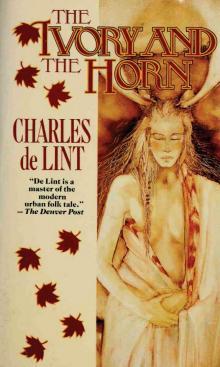 The Ivory and the Horn
The Ivory and the Horn Yarrow
Yarrow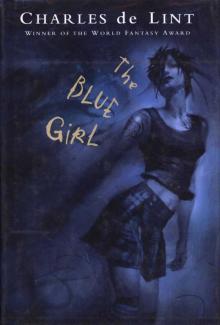 The Blue Girl
The Blue Girl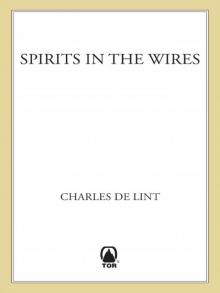 Spirits in the Wires
Spirits in the Wires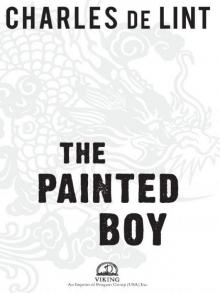 The Painted Boy
The Painted Boy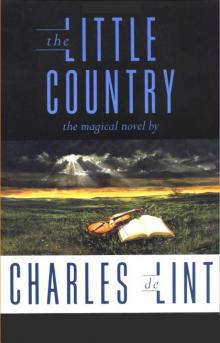 The Little Country
The Little Country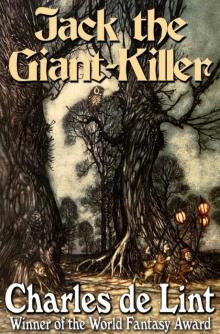 Jack of Kinrowan: Jack the Giant-Killer / Drink Down the Moon
Jack of Kinrowan: Jack the Giant-Killer / Drink Down the Moon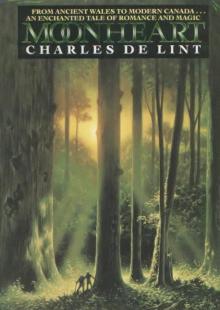 Moonheart
Moonheart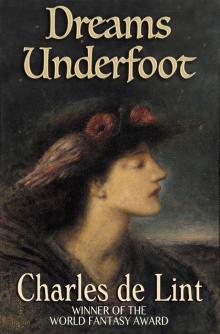 Dreams Underfoot
Dreams Underfoot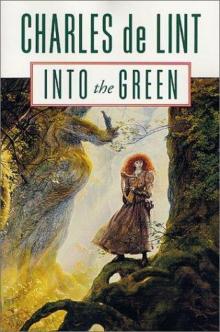 Into the Green
Into the Green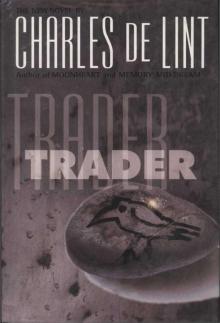 Trader
Trader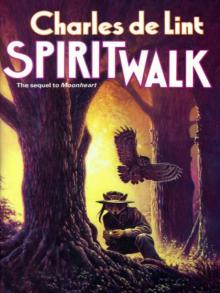 Spiritwalk
Spiritwalk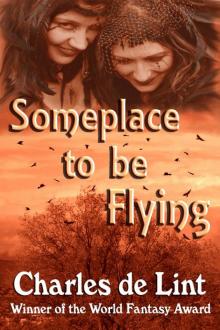 Someplace to Be Flying
Someplace to Be Flying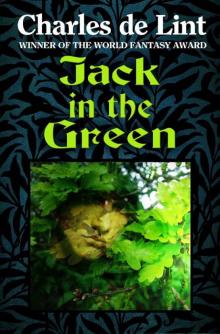 Jack in the Green
Jack in the Green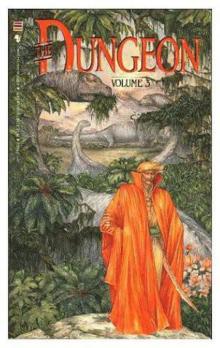 The Valley of Thunder
The Valley of Thunder Out of This World
Out of This World The Cats of Tanglewood Forest
The Cats of Tanglewood Forest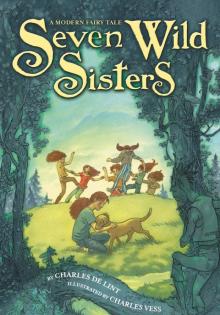 Seven Wild Sisters
Seven Wild Sisters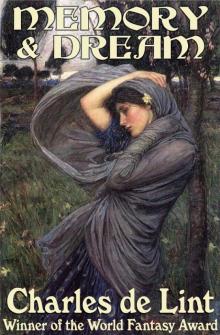 Memory and Dream
Memory and Dream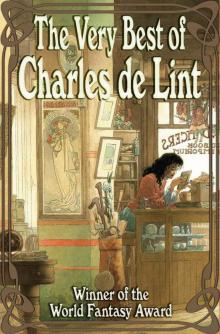 The Very Best of Charles De Lint
The Very Best of Charles De Lint Under My Skin
Under My Skin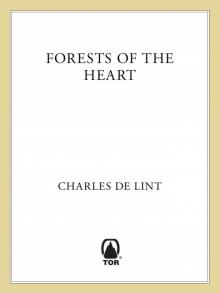 Forests of the Heart
Forests of the Heart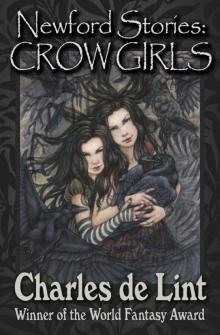 The Newford Stories
The Newford Stories Moonlight and Vines
Moonlight and Vines Angel of Darkness
Angel of Darkness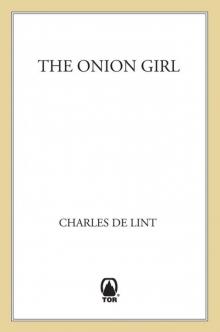 The Onion Girl
The Onion Girl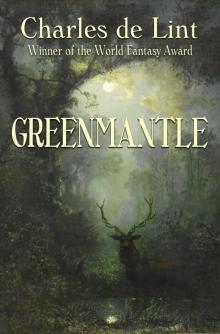 Greenmantle
Greenmantle Waifs And Strays
Waifs And Strays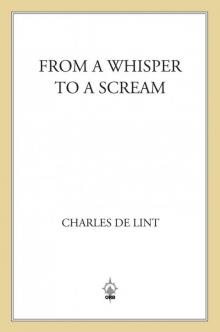 From a Whisper to a Scream
From a Whisper to a Scream Over My Head
Over My Head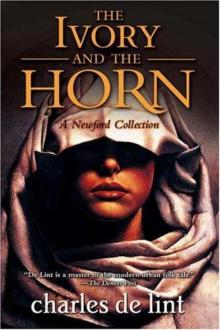 The Ivory and the Horn n-6
The Ivory and the Horn n-6 Our Lady of the Harbour
Our Lady of the Harbour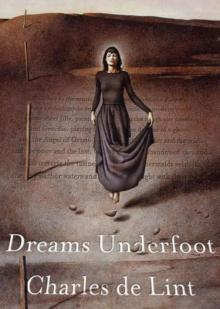 Dreams Underfoot n-1
Dreams Underfoot n-1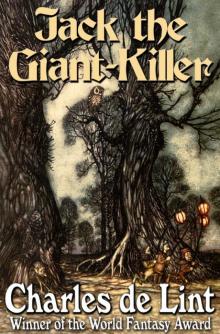 Jack the Giant-Killer (Jack of Kinrowan Book 1)
Jack the Giant-Killer (Jack of Kinrowan Book 1)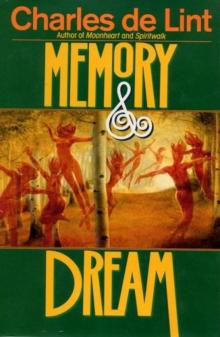 Memory and Dream n-5
Memory and Dream n-5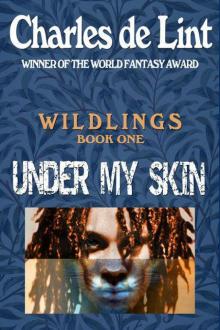 Under My Skin (Wildlings)
Under My Skin (Wildlings)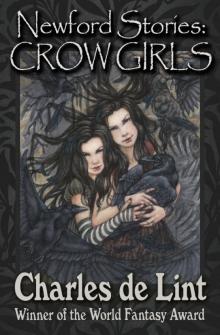 Newford Stories
Newford Stories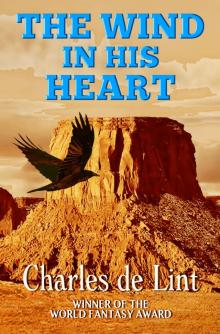 The Wind in His Heart
The Wind in His Heart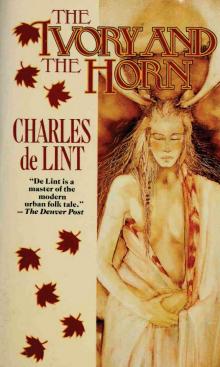 Ivory and the Horn
Ivory and the Horn